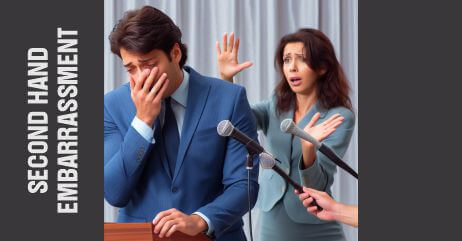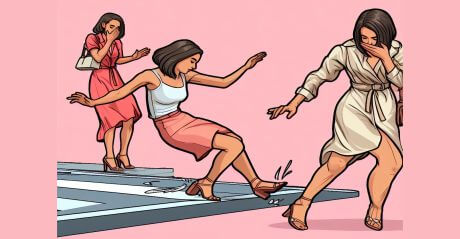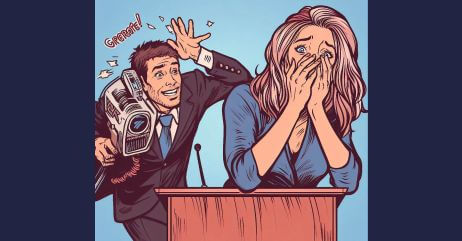Discover the psychology behind second hand embarrassment – why witnessing the awkward moments of others makes you cringe and how to stop it.
Secondhand embarrassment, or vicarious embarrassment, is a unique emotional response experienced when witnessing the awkward moments of others.
This blog post explores the causes and psychological impact of secondhand embarrassment, discussing how empathy and social awareness shape our reactions.
Learn effective coping strategies to navigate these uncomfortable situations and foster a supportive social environment.
Understanding this phenomenon not only enhances interpersonal connections but also helps mitigate feelings of social anxiety.
Discover the shared human experience behind secondhand embarrassment and how to approach it with empathy and humor.
This instinctive behaviour sheds light on the complexities of human empathy and social interaction.
In this article, we will discuss in detail the psychology behind secondhand embarrassment on individuals and society and how to manage it with reference to Marielle Collins, PhD a Clinical health psychologist.
Recommended: Understanding Social Awareness
Defining Secondhand Embarrassment
Secondhand embarrassment, often referred to as vicarious embarrassment, is a unique social phenomenon wherein you experience discomfort and awkwardness through the misfortunes or embarrassing moments of another person.
This emotional response is distinct from firsthand embarrassment, which occurs when one finds themselves in an uncomfortable situation directly.
While firsthand embarrassment is typically tied to personal experiences, secondhand embarrassment is characterized by an empathetic response to someone else’s misfortune.
Also Read: The Science Of Mind Management
Manifestations of Secondhand Embarrassment

This psychological reaction usually manifests when observing someone fail, make a social gaffe, or experience any form of public humiliation.
For instance, watching a friend stumble over their words during a presentation can evoke a sense of unease and discomfort in an observer, even if they are not personally involved.
The key elements that contribute to this phenomenon include:
- Empathy
- Social awareness, and
- The capacity to project oneself into the emotional state of another
Individuals who are highly attuned to social cues may find themselves particularly susceptible to feeling secondhand embarrassment.
The emotional experience often includes a blend of sympathy for the person enduring the embarrassing moment and a heightened awareness of the social norms that have been violated.
This complexity can lead to a mix of emotions such as discomfort, nervous laughter, or even a sense of relief when the situation resolves.
It reflects our ingrained social instincts and norms, highlighting the malleability of human emotions in response to social interaction.
Therefore, understanding secondhand embarrassment not only sheds light on our emotional connections with others but also reinforces the importance of empathy and social sensitivity in navigating interpersonal relationships.
Also Read: 14 Negative Traits Of Introverts And How To Overcome Them
Signs of Second Hand Embarrassment

1. Physical Discomfort: When experiencing this embarrassment, you may exhibit physical signs such as blushing, sweating, or fidgeting, mirroring the discomfort felt by the person in the embarrassing situation.
2. Avoidance Behaviour: You may also exhibit avoidance behaviour, such as looking away, covering your face, or leaving the situation, as a way to distance yourself from the source of embarrassment.
3. Empathetic Expressions: Facial expressions mirroring the emotions of the embarrassed person, such as wincing or cringing, can be a sign too.
4. Verbal Cues: Comments like “I can’t watch this” or “This is so awkward” indicate the experience of secondhand embarrassment.
5. Social Withdrawal: Some individuals may withdraw from the social situation or conversation to alleviate their discomfort.
Also Read: Why You Should Trust Your Instincts In Relationships
Causes of Secondhand Embarrassment

Secondhand embarrassment often arises from a myriad of social situations and behaviors that resonate with observers on a personal level.
Social Faux Pas
A common trigger for this phenomenon is social faux pas, which include instances such as someone mispronouncing a word or telling an inappropriate joke at an inopportune moment.
These errors not only elicit discomfort but invite a collective cringe among onlookers, as they could easily envision themselves in a similar scenario.
Clumsy Mistakes
Clumsy mistakes, particularly in public settings, are also significant contributors to the experience of secondhand embarrassment.
Examples may include an individual tripping while walking or struggling to navigate a simple task, like attempting to open a door.
Each of these instances serves as a reminder of our own vulnerabilities and imperfect moments, leading bystanders to feel a pang of empathy for the person on display.
Awkward Interactions
Awkward interactions, whether they happen in social gatherings or professional environments, frequently intensify this emotion as well.
Observing someone engaging in a conversation that goes awry or witnessing a cringe-worthy silence can evoke a palpable tension.
The feeling is compounded by the universal understanding that everyone has experienced such moments at some point in their lives.
Empathy
Empathy is when you can understand and share the feelings of another person.
According to research, when we witness someone else experiencing embarrassment, our brain may simulate the same emotions, causing us to feel embarrassed as well.
Social Norms
Social norms are the unwritten rules that guide behavior in social situations.
When someone violates a social norm, it can cause others to feel embarrassed or uncomfortable on their behalf.
Perception of Incompetence
When we see someone struggling or failing at something, it can trigger feelings of embarrassment or discomfort.
This may be because we associate competence with social status and view incompetence as a threat to our social standing.
Self-projection
Sometimes, we may project our own fears or insecurities onto others.
For example, if we are afraid of public speaking, we may feel embarrassed on behalf of someone else who is giving a speech.
Cultural Differences
Cultural differences also play a critical role in shaping responses to embarrassment.
Societies vary in their thresholds for what constitutes awkwardness or a faux pas, impacting how secondhand embarrassment is perceived.
In some cultures, public displays of embarrassment are seen as a more significant transgression, manifesting a deeper level of social scrutiny.
This diversity in communal attitudes underscores the complex nature of empathy; witnessing someone else’s awkwardness can create an emotional response so strong that it blurs the lines between the observer’s and the individual’s feelings.
Thus, empathy becomes a vital component in the experience of secondhand embarrassment.
Psychological Explanation of Vicarious Embarrassment

The psychological explanation for second hand lies in the activation of mirror neurons in the brain.
Mirror neurons are nerve cells that fire both when we act and when we see someone else perform the same action.
They are responsible for helping us understand and empathize with others, and for mimicking their behaviors and emotions.
When observing someone’s embarrassment, our mirror neurons activate, making us feel the same discomfort.
Our brains simulate their experience, triggering our own feelings of shame.
Social comparison theory explains that we compare ourselves to others, feeling embarrassed for them and worrying about judgment by association.
Related: Understanding and Cultivating Emotional Intelligence
The Psychological Impact of Secondhand Embarrassment
Secondhand embarrassment, a phenomenon experienced by many, can have profound psychological effects on individuals.
These feelings often trigger a range of emotional responses that may vary in intensity from mild discomfort to significant distress.
Empathy and Anxiety
When one witnesses someone else’s embarrassing moment, it can evoke a combination of empathy and anxiety, leading to an internal reflection on their social standing and experiences.
This reflection may inadvertently lead to altered self-perception, where individuals start questioning their actions, choices, and the potential for similar embarrassing situations in their lives.
Social Interactions
The impact of secondhand embarrassment extends beyond individual feelings; it also influences social interactions.
Observing another person’s cringe-worthy moment often elicits a shared sense of awkwardness among onlookers, which can either draw individuals closer together or create an emotional distance.
When people respond with laughter or supportive comments, it may serve as a bonding mechanism, allowing observers to navigate the discomfort together.
Related: The Pitfalls Of An Abrasive Personality
Embarrassment and Alienation
Conversely, if the subsequent reactions are judgmental or stigmatizing, this can lead to feelings of alienation, not only for the individual enduring the embarrassment but also for those who witness it.
Decline in Mental Health
Also, the distress associated with secondhand embarrassment can contribute to a more significant decline in mental health.
Individuals may become overly sensitive to their social environment, leading to increased anxiety in social situations.
This heightened sensitivity can create a cycle of avoidance, where the fear of witnessing or participating in potentially embarrassing scenarios deters individuals from engaging in social interactions altogether.
Over time, this can result in a weakened sense of belonging and escalate to conditions such as social anxiety disorder. Understanding the psychological ramifications of secondhand embarrassment is essential as it can help individuals recognize their feelings and foster a supportive dialogue around these shared experiences.
Also Read: Personality And How It is Developed
Effects of 2nd Hand Embarrassment

The effects of secondhand embarrassment can have a significant impact on you and your interactions with others, as well as broader cultural and societal dynamics.
Let’s take a look…
Impact on Personal Mental Well-being
Secondhand embarrassment can lead to feelings of discomfort, anxiety, or distress in individuals who witness embarrassing situations.
It may contribute to heightened self-consciousness and a sense of unease, impacting one’s overall mental well-being.
Influence on Social Interactions and Relationships
Witnessing secondhand embarrassment in others can affect how individuals perceive and engage with those involved, potentially leading to changes in social dynamics and relationships.
It may influence empathy and understanding within social circles, as well as the willingness to support others during embarrassing moments.
Effects on Self-confidence and Assertiveness
Individuals experiencing secondhand embarrassment may become more cautious or self-conscious in their actions, affecting their self-confidence and assertiveness in social settings.
It can impact one’s willingness to take risks or engage in activities that may lead to potential embarrassment.
Potential Cultural or Societal Consequences
Secondhand embarrassment can contribute to the shaping of cultural norms and expectations regarding social behavior and interactions.
It may influence the portrayal of embarrassing situations in media and entertainment, as well as societal attitudes toward empathy and understanding.
Recommended: Understanding Social Signals
Coping with Secondhand Embarrassment
Secondhand embarrassment is a common yet uncomfortable social experience that can affect individuals regardless of their age or background.
To effectively manage the feelings that arise from witnessing another’s awkward moment, several practical strategies can be employed.
Reframing the Experience
One of the foremost techniques involves reframing the experience. Instead of viewing the event as a negative occurrence, try to see it as a shared human experience.
By acknowledging that everyone makes mistakes, individuals can cultivate a sense of understanding that diminishes the embarrassment felt.
Sense of Humor
Another effective strategy is to develop a sense of humor surrounding the situation.
Recognizing the absurdity and humor inherent in many awkward moments allows individuals to diffuse tension and share a laugh with others present.
This shared laughter not only reduces the intensity of the embarrassment felt but also promotes social bonding, making the experience less daunting for everyone involved.
Use humor in a kind and supportive manner to engage with those who might be feeling embarrassed.
Suggested: Improving Your Social Skills with Social Intelligence Test
Support
Supporting others during their embarrassing moments is crucial, as it helps them navigate their discomfort.
Active listening, offering a comforting presence, or even making lighthearted comments can show empathy and understanding.
These actions can encourage the embarrassed individual to feel less isolated in their experience, creating a sense of community among peers.
Developing Self-awareness
Furthermore, developing self-awareness during social interactions can minimize the potential for secondhand embarrassment.
By paying attention to social cues and contexts, individuals can respond appropriately, often averting uncomfortable situations altogether.
By practicing these strategies, individuals can better cope with secondhand embarrassment, fostering a more empathetic and supportive social environment for themselves and those around them.
Understanding that everyone experiences awkwardness can lead to enriched interpersonal connections and a healthier perspective on social interactions.
Frequently Asked Questions
What is second hand embarrassment?
It is the feeling of embarrassment or discomfort that arises when witnessing someone else’s embarrassing or awkward behavior.
why do I get second hand embarrassment?
You experience secondhand embarrassment due to empathy, social awareness, and a shared understanding of embarrassing situations.
Why do we experience vicarious embarrassment?
We experience it because we can empathize with the other person and imagine how we would feel if we were in their shoes.
What are some common triggers of second hand embarrassment?
Common triggers can include social faux pas, awkward silences, public speaking mishaps, wardrobe malfunctions, and cringe-worthy behavior in general.
Is vicarious embarrassment a common phenomenon?
Yes, it is a fairly common phenomenon and can occur in various situations, such as watching a TV show, attending a live performance, or simply being in the presence of others.
Can second hand embarrassment cause physical discomfort?
Yes, it can cause physical discomfort or even pain, such as cringing, sweating, or feeling a knot in your stomach.
How can we manage or avoid vicarious embarrassment?
To manage or avoid it, you can try to detach yourself emotionally, focus on something else, or simply remove yourself from the situation. Additionally, cultivating empathy and understanding can help to reduce one’s tendency to feel embarrassed for others.
Conclusion
Second hand embarrassment aka vicarious embarrassment is a natural response to seeing someone else in an embarrassing situation.
It is a result of our innate social nature and our ability to empathize with others, can arise from a wide range of situations, and the type of embarrassment may vary depending on the specific circumstance.
The impact of second hand embarrassment can be complex and depends on a variety of factors.
While it can be uncomfortable to experience, it can also provide an opportunity for personal growth and increased empathy for others.
REFERENCES:

